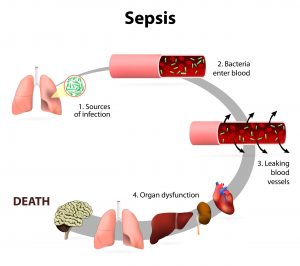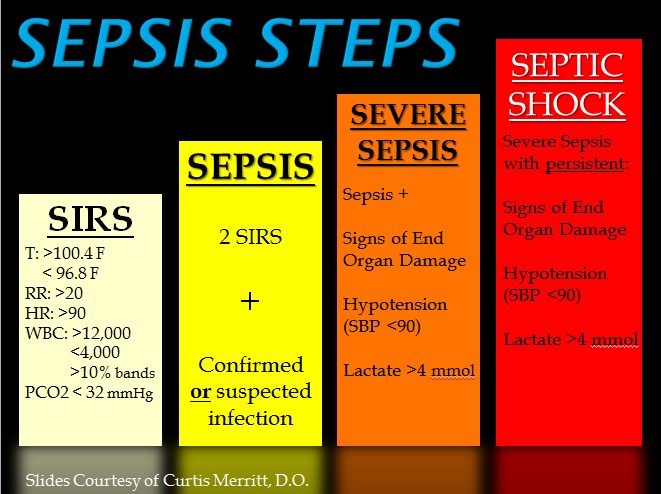When a Urinary Tract Infection Becomes Sepsis
Welcome back to my series addressing sepsis and why it is important to your cases. Feel free to email me with any questions regarding the information I have provided so far or if you would like some help with one of your cases.
Today we’ll review how a simple urinary tract infection (UTI) can lead to sepsis, septic shock, and potentially death if left untreated.
- We discussed that urinary output is a key indicator of kidney health and perfusion and that abnormalities will indicate potential acute kidney injury development.
- Therefore, it is important for nursing to monitor and assess urine output every shift daily.
The elderly lose their appetite naturally and so are at risk for developing UTI’s related to decreased drinking and decreased urine output. We talked about how decreased urine output can indicate a few issues such as a potential for dehydration which requires nursing intervention.
We’ve discussed that nursing should be educating the assistant staff on the importance of helping to monitor incontinence, characteristics of the urine, if there is pain with urination and importantly, reporting abnormalities to the nurse.
Patients/residents who are developing a UTI will start to feel unwell. Mental status changes is often the first sign of a UTI – displayed as new or increased confusion or lethargy [sleepiness, somnolence]. Nursing will often chart personality changes as well [angriness, outbursts, or very quiet, withdrawn]. The patient/resident will start to have a decreased appetite, which includes less fluid intake as well – becoming dehydrated as time passes. In our reviews, we often see the patient/resident going two or more days in this scenario as the infection worsens before nursing picks up on now worsening signs of something wrong. This is a failure of the staff to identify and assess for infection. The decreased urine output is putting the kidney health and perfusion at risk for infection and kidney damage. This is why when a nursing home resident is finally sent to the hospital, an admitting diagnosis often includes Acute Kidney Injury.

Paige Legal nurse consultants know what to look for in cases analysis such as:
- If a urinary tract infection is suspected, the expectation would be for the nurse to obtain an order for and obtain a urine sample to be sent out for testing
- To follow up on test results including culture and sensitivity if bacteria is identified.
- Nursing updates to the plan of care with all findings and appropriate interventions added.
- Monitoring of vital signs more often
These urine output abnormalities are leading to acute kidney injury development if left untreated. When an infection reaches a certain point, progression to sepsis can happen in a matter of hours.
Systemic Inflammatory Response Syndrome (SIRS) is the initial presentation when the infection is present and untreated. SIRS with a suspected source of infection is termed sepsis. For UTI sepsis, two of the SIRS signs, as well as a urine infection, need to be present.
Symptoms that would be evident include:
- Fever >100.4 F or <96.8 F,
- However, recall that a fever is an unreliable indicator of infection in the elderly and should not be used for definitive diagnosis, but in the overall assessment of infection. Critical nursing care involves assessing for fever or hypothermia if a urinary tract infection is suspected.
- Increased respiratory rate above 20 breaths per minute (tachypnea) or obvious shortness of breath (dyspnea),
- Increasing heart rate above 100 beats per minute (tachycardia),
- Decreasing urinary output or decreasing episodes of incontinence,
- Change in mental status is typically noted as new or worsening confusion or lethargy.

Sepsis with one or more end-organs in failure is called Severe sepsis. When low blood pressure cannot be improved and continues as hypotensive despite intravascular (IV) volume repletion is called Septic shock. Click here to go back to the email reviewing SIRS and Sepsis progression.
We hope you have been learning from our series on Sepsis. Keep watching your inbox over the next couple of weeks – we are going to look at Pressure Injury wounds and infection.
Paige Legal Nurse Consulting is a certified Legal Nurse Consulting firm with experienced acute care and nursing home nurses that are qualified to review cases involving infection and sepsis. Call 508-292-2372 or schedule your case development review online with us today!

Christie Paige MSN RN-BC LNC
Christie Paige is a Registered Nurse with over thirty years of experience. She brings her vast and extensive knowledge of clinical practice into the medical-legal arena as a Certified Legal Nurse Consultant. Mrs. Paige is the owner and senior nurse consultant of Paige Legal Nurse Consultants which specializes in Nursing Home cases focused on Sepsis, falls, pressure sore injuries and elder care medical malpractice.
